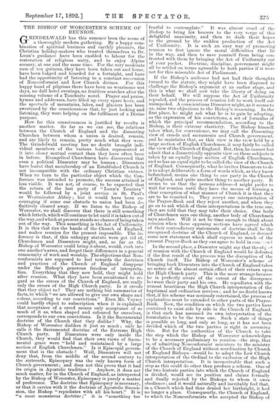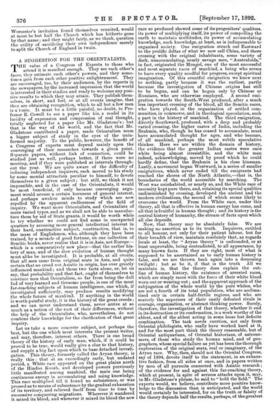THE BISHOP OF WORCESTER'S SCHEME OF REITNION. G RINDELWALD has this
summer been the scene of a thoroughly modern gathering. By a happy com- bination of spiritual business and earthly pleasure, the Christian holiday-makers who trusted themselves to Dr. Lunn's guidance have been enabled to labour for the restoration of religious unity, and to enjoy Alpine scenery, at one and the same time. For the very moderate sum of ten guineas, they have been taken out and home, have been lodged and boarded for a fortnight, and have had the opportunity of listening to a constant succession of Nonconformist and Low Church divines. For this happy band of pilgrims there have been no wearisome wet days, no dull hotel evenings, no fruitless searches after the missing volume of a Tauchnitz novel. Prayer and praise, hymns and addresses, have filled up every spare hour, and the spectacle of mountains, lakes, and glaciers has been sweetened by the consciousness that, by just looking and listening, they were helping on the fulfilment of a Divine purpose.
How far this consciousness is justified by results is another matter. So far as we can see, the relations between the Church of England and the dissenting Churches between whom a union is desired, remain, and are likely to remain, pretty much what they were. The Grindelwald meeting has no doubt brought indi- vidual members of the various bodies represented at it into closer mutual contact than they have often been in before. Evangelical Churchmen have discovered that even a political Dissenter may be human ; Dissenters have learnt that membership of an Established Church is not incompatible with the ordinary Christian virtues. When we turn to the particular object which the Con- ference was intended to promote, the success attained is less visible. It was not, of course, to be expected that the return of the last party of "Lunn's Tourists" would be followed by a joint service in St. Paul's or Westminster Abbey ; but it would have been en- couraging if some one obstacle to union had been de- finitively cleared away. If we listen to the Bishop of Worcester, we shall discover that there is still something which letteth, which will continue to let until it is taken out of the way, and which at present stands no chance of being taken out of the way. This something is the Act of Uniformity. It is this that ties the hands of the Church of England, and makes reunion for the present impossible. The in- ference is that, if this unhappy statute were got rid of, Churchmen and Dissenters might, and, so far as the Bishop of Worcester could bring it about, would, rush into one another's arms, and forget their differences in a general community of work and worship. The objections that Non- conformists are supposed to feel towards the doctrines and practices of the Church of England disappear under the Bishop's generous freedom of interpreta- tion. Everything that they now hold, they might hold after reunion. What they have been accustomed to re- gard as the errors of the Church of England, are really only the errors of the High Church party. Is it creeds that they object to ? They are nothing but summaries of facts, to which "we are allowed to give our own shape and colour, according to our convictions." Even Mr. Voysey could hardly object to subscription when it is explained that acceptance of a creed means only acceptance of so much of it as, when shaped and coloured by ourselves, corresponds to our own convictions. Is it the Sacramental doctrine of the Church that they dislike ? Why, the Bishop of Worcester dislikes it just as much ; only he calls it the Sacramental doctrine of the Extreme High' Church party. If Dissenters were only inside the Church, they would find that their own views of Sacra- mental grace were "held and maintained by a large section of English Churchmen." Is it Episcopal govern- ment that is the obstacle ? Well, Dissenters will not deny that, from the middle of the second century to the sixteenth, Episcopacy was the only known form of Church government ; and does not this prove that it had its origin in Apostolic tradition ? Anyhow, it does not much matter, for in the Church of England, as interpreted by the Bishop of Worcester, Episcopacy is purely a matter of preference. The doctrine that Episcopacy is necessary, or that it carries with it the doctrine of Apostolic Succes- sion, the Bishop "repudiates with all his heart." It is "a most monstrous doctrine ;" it is "something too fearful to contemplate." It was almost cruel of the Bishop to bring his hearers to the very verge of this delightful unanimity, and then to dash their hopes to the ground by the sudden production of the Act of Uniformity. it is such an easy way of promoting reunion to first ignore the moral difficulties that lie in the way, and then to save yourself from being con- fronted with them by bringing the Act of Uniformity out of your pocket. Doctrine, discipline, government might all be settled on terms agreeable to both parties if it were not for this miserable Act of Parliament.
If the Bishop's audience had not had their thoughts turned to the statute, they might have been disposed to challenge the Bishop's argument at an earlier stage, and this is what we shall now take the liberty of doing on their behalf. We will suppose the Act of Uniformity repealed, and the process of reunion left to work itself out unimpeded. A conscientious Dissenter might, as it seems to us, raise two objections to the Bishop's reasoning. In the first place, he might ask what he is to gain by adopting, as the expression of his convictions, a set of formulas of which the principal recommendation, according to the Bishop, is their extreme elasticity. The Bishop himself takes what, for convenience, we may call the Dissenting view of creeds and sacraments and Church government, and he maintains that, as this view is the view held by a large section of English Churchmen, it may fairly be called the view of the Church of England. But, then, he cannot but admit that a diametrically opposite view on these subjects is taken by an equally large section of English Churchmen, and so has an equal right to be called the view of the Church of England. Consequently, what he invites Dissenters to do is to adopt deliberately a form of words which, as they know beforehand, means one thing to one party in the Church of England, and quite another thing to another party. It seems to us that the persons addressed might prefer to wait for reunion until they have the means of forming a. clear conception of what manner of Church it is that they are to be reunited to. They accept one interpretation of the Prayer-Book and they reject another, and when they go on to ask which of these interpretations is the true one, they are told that they may take their choice. One body of Churchmen says one thing, another body of Churchmen says another. Will it not be time enough to think about reunion when these opposing sections have agreed which of their contradictory statements of doctrine shall be the recognised doctrine of the Church of England, or devised some new statement which shall express so much of the present Prayer-Book as they can agree to hold in coin:•lon ?
In the second place, a Dissenter might say that the obj.,ef, of reunion with the Church of England would be defeated if the first result of the process was the disruption of the Church itself. The Bishop of Worcester's scheme of bringing back Dissenters into the Church of England takes no notice of the almost certain effect of their return upon the High Church party. This is the more strange because he is perfectly aware of the extent of the divergence between their party and his own. He repudiates with the utmost heartiness the High Church interpretation of the baptismal and ordination services ; and he no doubt knows that, if his scheme was seriously entertained, the process of explanation must be extended to other parts of the Prayer Book. Now, the condition on which the two parties have contrived to exist side by side in the Church of England, is that each has assumed its own interpretation of the formularies to be the true one. Such a state of things is possible so long, and only so long, as it has not been decided which of the two parties is right in assuming this. But for the authorities of the Church to take the step which the Bishop of 'Worcester acknowledges to be a necessary preliminary to reunion—the step, that is, of admitting Nonconformist ministers to the ministry of the Church of England without reordination by Church of England Bishops—would be to adopt the Low Church interpretation of the Ordinal to the exclusion of the High Church interpretation. It is inconceivable that such a step as this could do other than produce a schism. One of the two historic parties into which the Church of England is divided, would see its position and claims formally and finally rejected by the Bishops to whom it owes obedience; and it would naturally and inevitably feel that, in a Church which had thus denied her birthright, it had no longer a place. Consequently, the Church of England, to which the Nonconformists who accepted the Bishop of Worcester's invitation found themselves reunited, would at most be but half the Church which has hitherto gone by that name ; and they might fairly, as we think, question the utility of sacrificing their own independence merely to split the Church of England in twain.



































 Previous page
Previous page